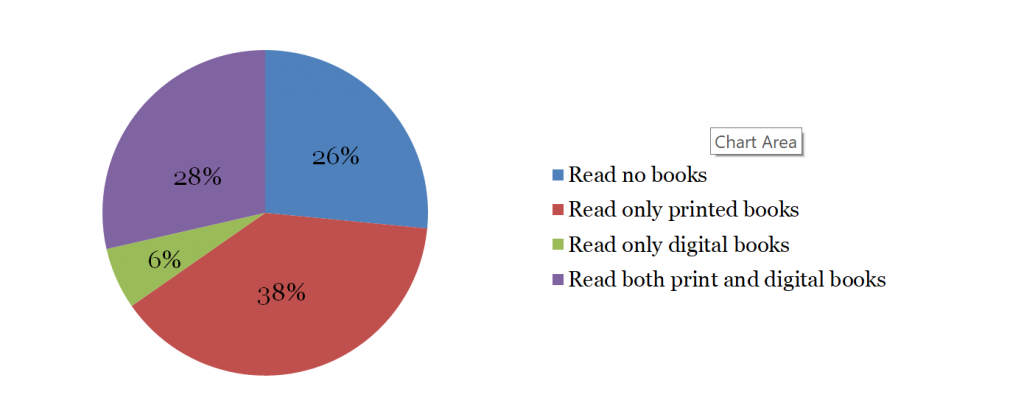Do people prefer to read on a physical paper book or the invention of e-book has taken over the concept of reading in this modern world?
As a child, I grew up with bedtime stories and visits to small bookshops on the weekends. I fell in love with the smell of books and the touch of the paper ever since I first started reading. I was surrounded by people who encouraged me to read and support my hobby of collecting books.
Because of that, I never hesitated to buy my favourite books no matter how expensive or worn out they may be. I would spend several hours at the library or the book shop, shuffling bookshelves and finding books to go home with.
However, it has gotten a little harder to find bookstores in your neighborhood these days since the invention of electronic books came along. An electronic book, also known as an ebook, is an electronic version of a printed book that comes with a text, image or both. In the space that a comparably sized physical book takes up, an e-reader can contain thousands of e-books, which is limited by its memory capacity.
It was originally invented back in 1971 as Project Gutenberg, founded by Michael S. Hart. However, those e-readers were not known or used widely as much as paper books back in those days. Although they have been recognized since around 1993, it wasn’t until the launch of Kindle e-reader by Amazon, Nook by Barnes & Nobles and Kobo by Kobo Inc. that the true age of e-books arrived. And they began to overtake hardcover books by overall publication figures in the U.S. by the early 2010s.
However, there have been widespread debates of the replacement of paper books with e-books. The variation between e-books and paperbacks comes down to the personal preference of individuals. Some people prefer to read on the computer screen, whereas other people prefer reading on the paper.
There has been a distinct shift of interest from printed books to e-books in the last 5 years, according to Pew Research Center, an American Think Tank. The analysis made by the center revealed that the share of e-book readers on tablets has more than tripled since 2011 and the number of readers on phones has more than doubled over that time.
The amount of e-book reading increased in the U.S. by 2014, in which 28% of adults read on e-books, compared to 23% in 2013, as per Survey Monkey. The report also explained that the reason behind it is that 50% of American adults had an e-reader or tablet, compared to 30% owning those devices in 2013. And according to a survey conducted by Pew Research, half of American adults now own a tablet or an e-reader and 3 in 10 people read e-books in 2013.
Joe Queenan, an American author and critic, said that electronic books are ideal for people who value the information contained in them or who have vision problems or who like to read on the subway or who do not want other people to see how they are amusing themselves or who have storage and clutter issues.
E-readers are regarded as the key to a healthier environment and saving money, with their space-efficient functions and convenience for the readers. The production of printed books uses 3 times more raw materials and 78 times more water to produce when compared to e-books. According to the Australian Bureau of Agricultural and Resource Economics and Sciences, about 1.63 million tonnes of paper are used on average for the production of newspapers and books yearly.

The concept of e-readers has much influence on the world of book readers and book traders that people have become concerned about paper books actually disappearing in future.
Robert Stein, the Founder of the Institute for the Future of the Book and the Co-founder of Voyager and the Criterion Collection, said, “Print will exist but it will be in a different realm and will appeal to a very limited audience, like poetry does today.”
People are more likely to choose digital readers, with which they can carry out their daily tasks without carrying 2 or 3 books at the same time. They would rather choose a simple light Kindle or Nook or Kobo reader, which they can simply read a thousand or more books in a small tablet at work or on the subway or anywhere else.
This has concerned bookstores, publishers and authors that they now fear those cheaper and more convenient e-readers would overtake the concept of reading.
But, is this true? Is this really the end of paper books? Are e-readers just going to sit in the front row of the book market?
There have been several facts and figures that show that true book readers are still favoring paper books more than e-books.
According to the Association of American Publishers, e-book sales fell by 10 percent in the first 5 months of 2015, after collecting data from nearly 1,200 publishers. The 2019 annual report of the same association also showed that publishers of books in all formats made almost $26 billion in revenue in 2018 in the U.S., with print making up $22.6 billion and e-books reaching $2.04 billion.

This graph represents the survey conducted by Pew Research Center in 2016. It shows that 28% of Americans read books in both print and digital formats, 38% read only print books and just 6% read only digital books.
Several reasons appear when one thinks why paper books have received readers’ demand more than e-books.
People have been used to reading on physical papers for a very long time. The use of e-readers may be more convenient and space-efficient than printed books, however, people still cannot get over the experience of reading paper books.
Survey Monkey asked people why they like to stick to the traditional way of reading. Many people say that there’s something about curling up with a good book in one’s hands that can’t beat. Anne Mangen, a Literacy Professor at Norway’s University of Stavanger, explained to Wired Magazine about the experience of reading paper books,
“Reading is human-technology interaction. Perhaps the tactility and physical permanence of paper yields a different cognitive and emotional experience; reading that can’t be in snippets, scanning here and there, but requires sustained attention.”
People who love reading paper books (including me) cannot get over them because of the feeling of having one in their hands.
According to Meryl Halls, the Managing Director of the Booksellers’ Association in the U.K., while technology and digital media has overtaken other entertainment industries such as music or news publishing, people still love to own physical books.
People who choose paper books over e-books cannot get over the magic of physical books- the touch, the smell, the presence of the book in the hand or just the whole existence of it. This is not something you can get from e-books.
In addition, e-books have several cons while being more space-efficient and less burdensome than printed ones as its pros. According to Survey Monkey, there is the risk of the lack of privacy for the user’s e-book reading activities. For instance, Amazon knows the user’s identity, what the user is reading, what page the user is on or whether the user has finished the book.
Researchers found that people comprehend the material they read on paper better than on e-readers and electronic reading can negatively impact the way the brain responds to the text.
However, an enormous amount of trees will be saved by the use of e-readers and e-books. As the world is changing and developing from day to day, the advancement in technology will also follow and if so, the demand for e-readers and e-books is still likely to increase. Laura Nevanlinna, the CEO of Kaiken Publishing, said “The printed book will continue to be essential to publishing in the next 10-15 years. However, it will become a luxury item (for e.g. Fancy bind-ups), especially with picture books and highly visual genres.”
In my opinion, the sales of e-readers and e-books will remain strong. People will still download their books and read them on their digital readers on the subway or between classes or before their bedtime. On the other hand, it is certain that paper books will always have a place in society. Millions of people will give everything for a new printed version of their favourite books and showcase them on bookshelves rather than downloading on e-readers.
And I’m sure there will still be a lot of people left who are excited to see a random bookstore on the street, spending hours and hours walking through the bookshelves and choosing their favourite paper books to take home.










